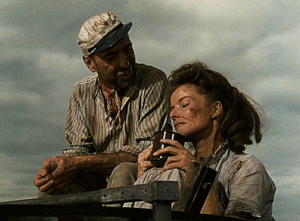The Travelling Players (1975)

…………………………………………………
The Travelling Players Movie Review
The Travelling Players (O Thiassos) is a 1975 Greek period film directed by Theo Angelopoulos. It’s a very inaccessible movie to me.
………………………………………………….
“I came cross the sea, from Ionia.
Where did you come from?“
…………………………………………………..
…………………………………………………..
The movie follows a troupe of theater actors as they perform around their country during World War II. While the production that they put on is entitled Golfo the Shepherdess, the thespians end up echoing scenes from classic Greek tales in their own lives, as she plots revenge on her mother for the death of her father, and seeks help from her brother.
My main issue with this film is its inaccessible nature. Most period films at least try to explain their storyline and historical context to the audiences, but this one never does that. Instead, it tries to be as minimalist in approach as possible, leading to an incomprehensible narrative that to me needed many more explanations. For anyone not entirely knowledgeable about Greek history, it’s bound to feel distant.
That is not to say that The Travelling Players is bad. It’s surely not, but it’s just not as great as many critics would say. It is undeniable that technically speaking, the movie’s a true spectacle. The direction from Angelopoulos is strong and visionary, and although the pacing is obviously slow and the runtime of four hours is of course beyond excessive, the cinematography itself is amazing.
The film utilizes static shots that are long and encompassing every action on screen perfectly. That approach made the viewing experience a chore to sit through, but the artistry at display is unquestionable. The score is also excellent and many scenes present some terrific imagery and really amazing shots.
…………………………………………………..
…………………………………………………..
However, the very little dialogue in its approach was to me its biggest issue as it prevented me to understand its narrative even more. It was a huge hurdle that the movie never overcame unfortunately. The characters are also just figures in the story and that final section was overly personal and dramatic in contrast to the rest of the story that is basically a spectacular period piece that encapsulates all of Greek history during the first half of the twentieth century.






